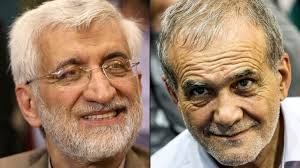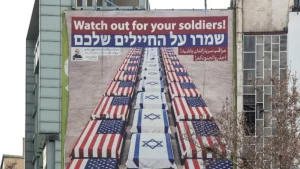The two candidates vying for the presidency of the Islamic Republic of Iran elucidated their blueprints and strategies on political and cultural issues during a two-hour televised presidential debate aired on Monday.
It was the first of two live debates before the July 5 presidential runoff vote featuring candidates Masoud Pezeshkian and Saeed Jalili. The second debate will be held on Tuesday evening.
Jalili, a former chief nuclear negotiator and head of the Supreme National Security Council, along with Pezeshkian, a seasoned parliamentarian who previously served as the health minister, secured the most number of votes in the first round of the country’s presidential election on June 28.
The first presidential debate with a new and more engaging format, which commenced at 9:30 local time, provided a platform for the two hopefuls to outline their plans in meticulous detail.
The first question tossed to the two candidates centered on their plans and strategies to bolster the nation’s participation in future elections.
Jalili emphasized the pivotal role of the people within the framework of the Islamic Republic, asserting that any progress achieved thus far has been the direct outcome of “people’s participation.”
He underscored that his future administration would assign roles to each Iranian based on their “talent,” aiming to foster increased and more effective involvement across various sectors.
The veteran political figure further expounded that leveraging the participation of the populace would facilitate the transition from the current state of affairs to an “ideal situation.”
Moreover, he indicated that if the people perceive that their concerns are acknowledged and there exists a comprehensive plan to address them, they would increase their engagement in civic affairs.
During his designated four-minute slot, Pezeshkian characterized the public as the “bedrock” of society, emphasizing that the rights of individuals must be acknowledged and their voices must be listened to.
He reiterated the importance of unity, underlining that in confronting adversaries, unity is paramount.
The seasoned lawmaker advocated for adherence to the law, ensuring justice as the means to enhance the engagement of the Iranian populace in the affairs of the nation.
The second question delved into the concept of “morality” in the context of elections.
When asked for his perspective on this matter, Jalili emphasized the necessity of ending unethical behaviors within the electoral sphere, affirming that “piety” should serve as the guiding principle for political engagements.
Pezeshkian, on the other hand, highlighted the significance of upholding and fulfilling promises as a pivotal factor in maintaining moral standards.
He stressed the importance of showing respect towards individuals, ensuring their voices are heard, and advocating for actions based on principles of justice and righteousness.
The former health minister also underscored the crucial role of trust in propelling the nation forward, emphasizing that honesty is essential in cultivating trust among the populace.
The third question was regarding the candidates’ approach to facilitating public demonstrations in accordance with the country’s Constitution and laws of the land.
Jalili asserted that every citizen has the right to voice their expectations, emphasizing the necessity for government officials to engage with the public and attentively listen to their demands.
In this regard, Pezeshkian proposed a systematic solution based on three fundamental principles: identifying responsible individuals, outlining their duties, and establishing accountability mechanisms.
Reiterating the importance of respecting people’s right to express themselves, he stressed the need for the people’s voices to be acknowledged and addressed.
Shifting to the fourth question concerning virtual space and its capabilities for productivity, Jalili highlighted the significant opportunities presented by the virtual realm, underscoring its integration with real-life activities in contemporary society.
He advocated for enhancing internet speed in the country to leverage the potential benefits of the digital landscape.
Pezeshkian also suggested that the Iranian population should harness the virtual space as a means to generate income, emphasizing the economic potential inherent in online platforms.
The fifth question revolved around the involvement of experts in decision-making processes, with Pezeshkian emphasizing the importance of considering an expert’s resume, capabilities, and skills.
He stressed that decisions should align with his government’s principles of justice and righteousness.
Pezeshkian reiterated the guiding principle of the nation’s foreign policy as “Neither East nor West,” outlining his government’s commitment to advancing national interests in the foreign policy sphere.
Additionally, he emphasized the reliance on scientific evidence, expert opinions, academic references, and international experiences in the decision-making process in the realm of foreign policy.
Jalili, for his part, advocated for expert-driven discussions, emphasizing the significance of informed decision-making and timely action.
He highlighted the crucial role of accurate decision-making and underscored the foreign policy arena as one of seizing opportunities.
The sixth question addressed the candidates’ strategies for steering international relations.
Pezeshkian underscored the importance of prioritizing relationships with neighboring nations and expanding global connections to foster the country’s growth.
He emphasized the necessity of diversifying foreign policy options to enhance trade and interactions.
In response to a query about continued breaches by the US in its commitments under the Joint Comprehensive Plan of Action (JCPOA), Pezeshkian outlined a strategy centered on bolstering the domestic economy, addressing banking and energy imbalances, and fostering internal consensus.
He emphasized a foreign policy approach grounded in national interests, the country’s overarching political agenda, and the directives of the Leader of the Islamic Revolution Ayatollah Seyyed Ali Khamenei.
Jalili advocated for broadening foreign relations beyond a limited scope of countries, emphasizing the cultivation of common interests to unlock further opportunities for the nation.
He pledged measures to counter sanctions by focusing on internal capacities and resilience and leveraging economic instruments to deter sanctioning entities.
In closing remarks, Pezeshkian said his foreign policy would aim to normalize relations with the world and added that he supports the implementation of FATF and JCPOA.
Jalili, in his closing remarks, not only vowed to manage the country, but to propel it forward.

